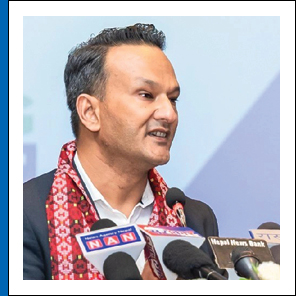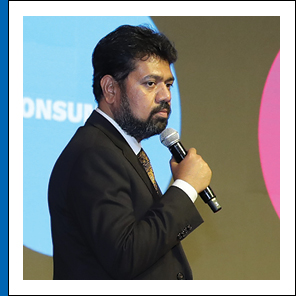Leadership development and promotion of values in sales
Sales professionals have a reason to be optimistic, as the national fiscal and monetary policies for 2025/26 are designed to increase aggregate demand during a prolonged economic slowdown. These favourable policies are expected to boost confidence among market players – including producers, traders, suppliers, service providers, and consumers – leading to an economic rebound.
The introduction of these policies has already generated excitement in the market. Key indicators for trade, sales, and bank loan mobilisation are now trending positively, reversing the sustained slump in demand seen in previous years. Imports have surged by 13.1% in the first 11 months of Fiscal Year 2024/25, a significant improvement from the approximately 2% negative growth during the same period last year. Similarly, credit grew by 7.69% in the first 11 months of Fiscal Year 2024/25, a notable increase compared to previous months. Consumption is also rising, along with the improved purchasing power of people across the country. Remittance inflows are setting new records, totalling Rs. 1,532.93 billion in the first 11 months of FY 2024/25, an increase of 15.5%.
In this environment, sales professionals are essential to revitalising the economy through effective sales strategies, planning, communication, negotiation, deal-making, after-sales service, and consumer relationship management. Senior economist Keshav Acharya noted, “Sales professionals act as a lubricant for the economy and are always on the front lines of business. They represent companies, products, and services (brands) when engaging with consumers.” He added, “They are like bees who not only produce honey but also help maintain biodiversity through pollination. They are a symbol of dedication, consistency, passion, and hard work.”
From order-takers to growth-makers
Improving the customer experience and focusing on customer-centricity is the key to leadership in sales. “It’s not just about hitting targets; the most important thing for sales professionals is to understand that they are there to help customers achieve their goals. Their role is to help customers make informed decisions and the right choices that meet their unmet needs,” explained Praveen Bangera, Founder and Director of Xverse Ltd. in Dubai, UAE. “This is the fundamental aspect of customer-centricity and customer experience management throughout the entire lifecycle of a customer’s relationship with a product, brand, or service.”
Bangera stressed that if sales professionals focus solely on achieving targets by any means necessary, they risk damaging customer relationships and ultimately losing market share, even if they achieve short-term gains. “A sales professional should be like a dark horse in a long race. If they truly deep-dive and understand what customers are looking for, there will likely be more opportunities to sell to those customers, rather than just using a monolithic, targeted, or push-based sales approach,” said Bangera. “Sometimes, customers don’t even know what they are looking for. That’s where a salesperson comes in, to help and persuade the customer to understand their true, unmet needs – not just their aspirational or wishful desires.”
Sales professionals are more than just order-takers who make deliveries. The sky’s the limit for their innovation, from redesigning the sales process to creating effective communication and orientation for consumers through various technological mediums. Their ideas, strategies, sales planning, communication, information dissemination, demand creation, deal-making, after-sales service, and consumer relationship management all provide momentum to the economy. Because of their efforts, they aren’t just seen as dealmakers; they are, in fact, growth makers.
Cultivating agility, empathy, and strategic foresight
Sales require an agile process, empathy with consumers, and strategic foresight. To develop these skills, sales professionals must be given opportunities for training and exposure. Since sales is a sophisticated and dynamic field, it requires continuous upskilling and reskilling of those who work in it. Industry leaders have emphasised that the country needs more professionals, innovations, and expertise in this area.
Sales demands regular feedback from consumers, an understanding of changing consumer behaviour, and an assurance of customer satisfaction, regardless of a brand’s popularity. Sales can also be complex, as it relies on consumer choices, satisfaction, and trust. This involves various processes, such as meeting consumer expectations, boosting their satisfaction, and helping them understand a product’s features, utility, and value for money. For long-term relationships, it involves feedback, after-sales service, and updates on modern features, among other things.
Designing sales campaigns, consumer engagement, interaction, and building trust and satisfaction must be handled with a micro-level of planning, understanding, thoughtfulness, and sensitivity.
Ethics
Sales can only survive on an ethical foundation. Unethical practices not only damage a company’s reputation but can also lead to its complete disappearance from the market. Sales must be based on values and flourish in an ethical environment. “Those who adhere to certain standards, norms, and values are always responsible toward people and the planet (the environment and beyond),” remarked Upendra Poudyal, Chairperson of CBFIN (Confederation of Banks and Financial Institutions Nepal). Poudyal is a proponent of values-based banking, which, for example, considers the environmental impact and the well-being of people when lending. “When we are facing the challenge of a climate crisis, funding a coal-based plant would be beyond our values,” he said. “The objective of values-based banking is that all beings may be happy with the final results.”
Such values and ethical practices don’t have to be promoted only by pioneers or first movers; they can be cultivated, nurtured, and established by anyone who prioritises values over mere self-interest.
While it is believed that sales and business are profit-oriented and driven by interest, Poudyal argues that they don’t necessarily have to be. Businesses can make a profit while operating on certain values, standards, and ethical principles. The values in sales must be clarified for consumers, who need to understand the pros and cons of products and services. Furthermore, unethical and deceptive practices can have fatal consequences. Those who promote values and ethics can survive for the long term and establish themselves as trusted members of society.
Navigating the VUCA times
Following the COVID-19 pandemic, the world has been navigating the VUCA – Volatility, Uncertainty, Complexity, and Ambiguity – era. “Leadership is more critical than ever in VUCA times to guide teams in the right direction. The prolonged global slowdown caused by the pandemic and its adverse impact has put the global economy in a very delicate, precarious, and brittle situation,” highlighted Suman Pokharel, Deputy CEO of Global IME Bank. “Navigating such a situation with minimal loss and damage requires a very conscious effort, a thoughtful handling akin to profound craftsmanship, to drive the sales process during these turbulent times.”
Effective sales require a systems-thinking approach based on rational grounds. It’s not merely about designing a product and finding customers; the entire sales cycle is complex, requiring more than simple observation and intuitive inference. It must be driven by evidence-based, conscious analysis and strategic decisions to ensure better payoffs – not only in monetary terms but also in terms of reputation, brand value, and consumer trust, among other factors.
Against this backdrop, the HRM Nepal reached out to industry leaders and professionals from diverse sectors to understand the skilling of people in this field, the promotion of values, and leadership development practices. This initiative also provides insight into the learning and development (L&D) and leadership practices of Nepal’s top industries, businesses, and service providers.
 ‘Internal empowerment helps to build a positive culture’
‘Internal empowerment helps to build a positive culture’
Harkirat Singh Bedi, CEO/Business Head, Dabur Nepal
One tries to instill internal empowerment in the team through building their self-confidence, increasing their self-awareness, driving internal motivation, making them more perseverant, resilient and tough to face challenges head on and, lastly, providing them with freedom and autonomy to make impactful decisions. So, all in all one strives to create inner strength and belief in the team so that they feel they are in control as opposed to being controlled by external circumstances.
In my leadership journey, I have witnessed that fostering a culture of inner empowerment has a direct and profound impact on organisational goals and overall organisational performance. When people are empowered from within one sees an organisation which is more engaged, proactive and has high levels of commitment. Internal empowerment also helps in taking ownership, fostering innovation, employee retention, driving agility and creating strong leaders across the organisation and across levels. So, all in all, internal empowerment helps to build a positive culture and increases the scope for organisational success.
 ‘We promote autonomy to innovate, clarity to act, and confidence to lead’
‘We promote autonomy to innovate, clarity to act, and confidence to lead’
Joseph Sebastian, Chief Operating Officer, Chhaya Centre
Empowering from within is the foundation of sustainable leadership. At the core of our strategy is cultivating ownership, trust, and continuous learning within our teams. We equip our sales executives not just with tools and targets, but with the autonomy to innovate, the clarity to act, and the confidence to lead. Regular skill-building, cross-functional exposure, and open communication ensure they are prepared to navigate and lead in dynamic markets. When teams feel truly empowered, they don’t just meet goals – they set new benchmarks.
In my leadership journey across diverse industries – from publishing and motorbikes to restaurants and casinos – I’ve learned that inner empowerment is the true catalyst for outward impact. Whether leading a sales team in a fast-paced showroom or building brand presence in hospitality and entertainment, the common thread has been cultivating a culture where individuals feel trusted, capable, and motivated to take ownership. When people are empowered from within, they don’t just chase targets – they lead with purpose, adapt with agility, and influence the market with confidence. I’ve seen firsthand how this internal strength not only drives performance but also creates a ripple effect of innovation and excellence across the entire organisation.
 ‘Nimbus focuses on culture of trust, learning, & accountability’
‘Nimbus focuses on culture of trust, learning, & accountability’
Madhav Kafle, Vice President-Business Development, Nimbus Holdings
For any team to succeed in a competitive market, internal empowerment is a must. As a leader, I believe in creating an environment where people feel trusted, supported, and ready to take ownership.
First and foremost is clarity and communication. Everyone in the team should know the direction we’re heading and the role they play in that journey. I keep communication open – people are free to share ideas, feedback, and even mistakes without fear. This helps build confidence and improves decision-making across levels.
Training and development are key tools I use to empower my team. We provide regular training not just on technical aspects but also on leadership, negotiation, and market understanding. For example, we once identified a young executive with strong potential. We gave him the chance to lead a pilot project. With proper guidance, he delivered great results and is now managing a key territory. Another strategy I use is delegating ownership. When people are trusted with responsibilities and allowed to take decisions within defined boundaries, they feel more responsible and motivated. In our commercial team, assistant managers know the impact of pricing decisions for company and market share. This has helped us become more agile and responsive and ensure growth in market share. I also make sure to recognise efforts. Even small wins are appreciated – this builds morale and encourages others to step up. During team reviews or internal meetings, I highlight success stories and make sure team members are publicly appreciated.
Finally, I lead by example. I show commitment, take responsibility, and stay accessible to my team. This builds a culture where everyone is inspired to lead – not just follow. Empowering a team is an ongoing effort. But when done right, it creates strong leaders who are ready to handle challenges and drive growth in any market. In our organisation, I focus on building a culture of trust, learning, and accountability. One of the key ways I do this is by encouraging open communication. Everyone is welcome to share their ideas, feedback, or concerns, no matter their position. This not only builds confidence but also helps us discover creative solutions and stay ahead of market changes.
I also believe in setting clear goals and giving ownership. When team members know what they’re working toward – and they’re trusted to make decisions – they perform at a much higher level. One small change we made was allowing mid-level managers to finalise local pricing decisions within a set margin. The results were remarkable – response time improved, and client satisfaction increased.
Empowering a team internally is not just about giving authority or responsibility – it’s about creating the right environment where people feel confident, capable, and motivated to make decisions, take ownership, and lead with purpose.
In short, empowerment is not a one-time effort. It’s a continuous process of trusting, training, and supporting people so they can grow and lead from within.
 ‘Empowerment is less about giving authority and more about creating belongingness’
‘Empowerment is less about giving authority and more about creating belongingness’
Rashmi Pant, Chief Business Officer (CBO), Prabhu Bank
Empowerment, to me, is less about giving authority and more about creating belonging. I try to ensure my team feels genuinely heard not just during structured reviews, but in everyday decisions. Their ideas matter and I let them know that. When people sense that their voice holds weight, they begin to lead not because they must, but because they believe they can.
In my experience, when individuals are empowered from within, they begin to lead with intention, not imitation. It reshapes the culture from compliance to commitment, from execution to initiative. Over time, this has had a far-reaching impact. It’s not just about better sales or stronger numbers, it’s about people who carry the values of the institution in ways that influence, inspire, and quietly transform the spaces they touch.
‘Empowerment of the team enables sound decision to grow and thrive’
 Suman Rayamajhi, Co-founder, Upaya Cargo
Suman Rayamajhi, Co-founder, Upaya Cargo
From the beginning, we have structured Upaya as an institution with a strong foundation in corporate governance. With a future IPO in mind, the company has established a two-tiered management structure below the Board of Directors: an Executive Committee and a Core Team. The Core Team consists of all division heads. The Executive Committee makes joint strategic decisions, which are then delegated to the Core Team for operational execution. Each division head is held responsible and accountable for their decisions and performance.
During the annual operational planning cycle, division heads are empowered to create the initial budget in alignment with the strategic plan. This bottom-up approach with proper delegation of authority fosters a culture of internal empowerment, allowing our teams to lead effectively.
I have always believed in empowering my team. My primary role is to guide them in making sound decisions, thereby cultivating more leaders who can drive the organisation’s future growth. This approach also requires leaders to accept that subordinates will make mistakes. Instead of criticising them, we should help them learn from those errors. This process is crucial for developing future company leaders, as leadership is primarily about making informed decisions. The growth achieved through empowerment far outweighs the occasional cost of mistakes.
 ‘Confidence with knowledge is key for efficiency and problem solving’
‘Confidence with knowledge is key for efficiency and problem solving’
Bibek Bijukchhe, CEO, Pooja International
Being in the service industry, I ensure that my team members understand what we are trying to accomplish and that they feel trusted to make decisions. I urge them to learn, to bring ideas to share and execute. When employees are energised and focused, they give the best output, and subsequently provide the best possible service to our customers.
Employees who feel confident, tend to be more fruitful in their work and more efficient at solving problems. Satisfied customers return and spread the word of mouth, pushing our company to become even stronger. So, I believe when we take care of our team, they take care of our clients, and that fuels our success in the future.
 ‘Performance can be improved through trust and fair appraisal of employees’
‘Performance can be improved through trust and fair appraisal of employees’
Sharad Chandra Ojha, Executive Director, Ideal Pharmaceuticals
We allow our marketing team members to localise product positioning based on regional sales trends, rather than imposing outdated strategies. This approach is rooted in the belief that people perform better when they feel trusted and fairly appraised. I rely on a knowledgeable marketing and sales team, which leads to quality sales management and execution. We also readily accept good ideas from junior staff and colleagues.
Developing a team’s competence requires coaching, demonstration, and monitoring, while also giving them the freedom to execute. We scale growth by giving individuals the space to foster their own ideas and performance, as long as it doesn’t contradict our core purpose and processes. Inner empowerment is not a simple mechanism; it’s a strategic, technical, and sometimes tricky process. It builds ownership, accelerates execution, and transforms unknown teams into high-performing industry leaders.
 ‘Our organisation fosters growth through continuous learning, advanced CRM tools and a culture of collaboration’
‘Our organisation fosters growth through continuous learning, advanced CRM tools and a culture of collaboration’
Kaji Man Subba, Director- Sales, Gorkha Brewery Pvt. Ltd.
I’ve cultivated deep listening and strategic empathy – skills that help me understand client needs beyond the surface. Internally, resilience and adaptability have become my anchors, allowing me to lead with clarity and confidence in dynamic sales environments.
My organisation fosters growth through continuous learning, advanced CRM tools, and a culture of collaboration. These elements empower me to exceed targets and influence not just sales outcomes, but also team morale and client trust.
 ‘We spent considerable time to frame an actionable operational plan’
‘We spent considerable time to frame an actionable operational plan’
Anish Lamichhane, Business Consultant, KIA Nepal
Critical skill I’ve honed is shifting focus from ideas to execution – ensuring that discussions translate into actionable operational plans. While innovation is important, I prioritise mobilising the team around clear, structured execution to drive measurable results
My organisation empowers me to exceed targets and drive influence beyond the sales floor by fostering a culture of autonomy, innovation, and strategic support. I’m given the freedom to push boundaries, test new approaches, and implement creative strategies – all while having access to the tools, training, and mentorship needed to refine and scale these ideas effectively. This balance of trust and structured support ensures I can take calculated risks, optimise operations, and lead with confidence, ultimately enabling me to not only meet goals but also inspire my team and influence broader business outcomes
 ‘Empowering our team is at the heart of SALICO’s transformation’
‘Empowering our team is at the heart of SALICO’s transformation’
Chunky Chhetry, CEO, Sagarmatha Lumbini Insurance Company Ltd.
At SALICO, we focus on enabling our teams through continuous learning, trust, and autonomy. We regularly conduct in-house and external trainings to enhance both technical and leadership capabilities. We avoid micromanagement and instead provide a clear strategic direction, allowing teams the space to function independently, take ownership, and grow within their roles. This combination builds confidence and equips them to lead effectively in their respective markets.
Empowering our people has been at the heart of SALICO’s transformation. Many individuals who started in junior roles have grown into key managerial and executive positions, both within our organisation and across the broader insurance industry. This speaks volumes about the kind of environment we strive to create; one that nurtures potential and rewards initiative. Over the years, this culture has fuelled our journey from Rs. 1.58 crores to over Rs. 500 crores in premium collection. Beyond the numbers, it has helped shape SALICO into a trusted, growth-driven brand in Nepal’s non-life insurance landscape, powered by people who are equipped to lead from within.
 ‘Working with brains helps you to evolve in dynamism’
‘Working with brains helps you to evolve in dynamism’
Harish Kumar Bhatt, Director-Sales & Marketing, The Soaltee KTM
One of the key strengths I’ve developed is the ability to lead with clarity and purpose, especially in high-pressure, fast-paced environments. Over time, I’ve learned that success in sales and marketing isn’t just about numbers, it’s about understanding people, markets, and timing. At The Soaltee Kathmandu, Autograph Collection, I’ve had the opportunity to refine that skill, responding quickly to changing demands while contributing to the legacy of excellence that defines our property.
What stands out most at The Soaltee is the culture of ownership and growth. You’re not just working for the brand; you’re evolving with it. There’s genuine encouragement to go beyond the checklist, take initiative, and bring creative ideas to life. While we’re equipped with the right tools, from local systems to global insights; it’s the people and shared ambition that truly drive impact. It’s this environment that empowers you to lead with purpose, whether that means enhancing the guest experience, forging strategic partnerships, or mentoring the next generation of leaders.
 ‘Understanding customer behaviour and team dynamics is our priority’
‘Understanding customer behaviour and team dynamics is our priority’
Deepak Thapaliya, Automotive General Manager, Laxmi Group
Over the years, I’ve realised that developing inner strengths like consistency, emotional control, and genuine listening has played a big role in how I approach both clients and my team. Sales can be unpredictable, but staying calm and focused helps build long-term relationships. I’ve also worked on being more analytical – understanding customer behaviour and team dynamics better – which gives me the confidence to lead conversations and decisions from a more informed place. These internal habits have gradually shaped how I present myself externally – as someone others can rely on.
Our organisation has been a strong backbone when it comes to internal empowerment. Whether it’s regular product training, sales process coaching, or access to the right digital tools, we’re given what we need to grow. But beyond tools, what really makes a difference is the trust-based culture – where leadership encourages taking ownership and trying new ideas. This gives us room not just to meet sales targets but to guide and inspire the people around us. Personally, that kind of environment motivates me to keep pushing boundaries – not just in numbers, but in impact.
 ‘Salespeople can provide deep insights that traditional market research might miss’
‘Salespeople can provide deep insights that traditional market research might miss’
Praveen Bangera, Founder and Director of Xverse Ltd., UAE
When sales personnel are upfront with customers and truly understand their needs and psychology, this valuable information can be passed on to product development. This practice is often neglected today because sales teams are primarily driven by targets, not by understanding customers.
Salespeople can provide deep insights that traditional market research might miss. If they can channel this information in a structured and constructive way, it can realign products and services to become truly valuable for customers. This allows us to build a strong value proposition rather than focusing on how to maximise sales by simply pushing products.
This approach not only secures the first sale but also fosters long-term relationships, earning customer trust and loyalty. Treating sales as a short-term game of convincing customers to meet targets is an expensive and short-sighted strategy. It deteriorates customer understanding of the offerings and breaks consumer trust. Therefore, we must promote high standards and values in sales to establish a reputation, gain consumer confidence, and empower our sales team for long-term success in the industry.
 ‘We promote accountability and provide skills to lead in a fast-evolving market’
‘We promote accountability and provide skills to lead in a fast-evolving market’
Sewa Pathak, CEO, Vianet
At Vianet, we drive internal empowerment by setting clear KPIs at every level of the organisation. When team members understand what success looks like and how their performance contributes to the company’s goals, they feel more accountable and motivated. These KPIs are not just targets — they are tools for alignment, ownership, and continuous improvement. We combine this with regular feedback, leadership and cross-functional collaboration to ensure our teams are not just meeting expectations, but developing the mindset and skills to lead in a fast-evolving market.
Earlier in our journey, Vianet operated with a more top-down approach, where direction and decisions were largely centralised. Over time, we realised this limited ownership and agility. We’ve since shifted to a more structured way of working, anchored in clearly defined Key Performance Indicators and Key Results. This has made every team and individual more accountable, aligning efforts across the organisation. It also helps us focus on what truly matters — instead of constantly firefighting, we’re now tracking progress, solving root issues, and moving forward with purpose. This change has significantly improved both our internal culture and our overall performance.
 ‘Leading from the front and staying connected with the ground realities are key mantras for sales professionals’
‘Leading from the front and staying connected with the ground realities are key mantras for sales professionals’
Upendra Pradhan, Business Head-Beverage & Personal Care, Chaudhary Group
Over the last 24 years working in the FMCG industry in Nepal, I’ve developed several internal strengths that now drive my ability to lead teams and work effectively with trade partners and stakeholders:
Factual Market Lead Decision Making: One of my core strengths is making decisions based on real market data and insights. I’ve learned to filter through noise and focus on actionable trends – be it in sales patterns, consumer behaviour, or trade feedback. This ensures that my strategies are grounded in reality and deliver measurable results.
Resilience and Consistency: FMCG is a fast-moving and highly competitive sector. Over the years, I’ve developed the internal resilience to adapt quickly to changes – be it price pressures, new competition, or distribution challenges – while keeping teams focused and consistent in execution.
Leadership and Engagement: I believe in leading from the front and staying connected with the ground realities. My experience has taught me the importance of building strong, motivated field teams and empowering them through regular communication, trust, and accountability.
Channel and Relationship Management: Having worked closely with distributors, retailers, and wholesalers across Nepal, I’ve developed strong relationship management skills. Internally, I’ve learned patience, negotiation, and adaptability, which helps me externally in building long-term partnerships.
Strategic Agility: While I rely on data, I also apply experience-based intuition to quickly realign strategies when required – whether it’s launching a new product, shifting promotional efforts, or optimising supply chains.
My organisation empowers me in several meaningful ways that go beyond just meeting sales targets – it enables me to drive real market impact:
Data and Market Intelligence Tools: I’m supported with timely sales reports, market analytics, and consumer insight tools that allow me to make informed, targeted decisions. This access to data strengthens my ability to plan promotions, optimise distribution, and respond swiftly to market shifts.
Continuous Learning and Training: Regular training programmes – whether focused on market trends, category growth, negotiation, or leadership – help me stay sharp and adapt to changing consumer preferences and trade dynamics. These sessions often introduce practical tools that I can apply immediately in the field.
Empowered Culture and Ownership: I’m given the autonomy to take initiative in my field/unit and to pilot ideas that are grounded in local realities. This trust from leadership creates a sense of ownership that drives me to exceed expectations – not just for sales, but in building stronger relationships and team performance.
Cross-Functional Collaboration: The culture encourages coordination between sales, marketing, supply chain, and finance, which ensures that we work as one team with aligned goals. This collaboration improves efficiency and enables faster execution in the market.
Recognition and Feedback: Performance is acknowledged and appreciated, which fuels motivation. Constructive feedback and performance reviews are also a part of the process, helping me to continuously refine my approach.
 Sales is a complex process to be led by evidence-based and wise decisions’
Sales is a complex process to be led by evidence-based and wise decisions’
Uday Shrestha, VP- Sales & Marketing, Gorkha Lahari Pvt. Ltd.
Over time, I’ve developed a few key internal strengths that now play a crucial role in how I lead both clients and teams externally:
Empathy: I’ve cultivated the ability to remain calm under pressure, listen actively, and understand others’ perspectives. This has helped me build trust with clients and guide teams through challenges without losing momentum.
Strategic Thinking: Internally, I’ve learned to step back and see the bigger picture – balancing immediate tasks with long-term goals. This allows me to make sound decisions, prioritise effectively, and offer clients clear, forward-looking advice.
Resilience: Through experience, I’ve built a strong internal drive and persistence that helps me stay solution-oriented even when facing setbacks. This resilience reassures clients and motivates teams during demanding phases.
Effective Communication: I’ve worked hard on refining how I convey ideas – ensuring I can present complex concepts simply and persuasively. This helps align internal teams and inspire client confidence.
Negotiation Skill: I’ve learned to approach negotiations not as battles to win, but as opportunities to find mutually beneficial outcomes.
We ensure sales team receive regular training sessions focused on market trends, competitor insights, and retail execution excellence. We also train sales team in data-driven selling, which has helped me present value-based arguments to retailers and distributors.
The tools we use – like sales tracking apps, outlet performance dashboards, and route optimisation software – allows me to plan smarter, identify growth gaps, and react quickly to field challenges. These tools help me drive volume, distribution, and availability more efficiently.
Most importantly, the company fosters a culture of ownership and accountability. Leadership encourages innovation and autonomy – if I see an opportunity to optimise a process or support a teammate, I’m empowered to act on it.



